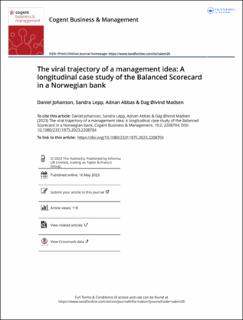The viral trajectory of a management idea: A longitudinal case study of the Balanced Scorecard in a Norwegian bank
Peer reviewed, Journal article
Published version
Permanent lenke
https://hdl.handle.net/11250/3070542Utgivelsesdato
2023Metadata
Vis full innførselSamlinger
Originalversjon
Johanson, D., Lepp, S., Abbas, A. & Madsen, D. Ø. (2023). The viral trajectory of a management idea: A longitudinal case study of the Balanced Scorecard in a Norwegian bank. Cogent Business & Management, 10(2), Artikkel 2208704. https://doi.org/10.1080/23311975.2023.2208704Sammendrag
In this paper the virus theory is applied to gain insight into the intra-organizational diffusion and evolution of the Balanced Scorecard. The study draws on longitudinal data about the use of the Balanced Scorecard in a Norwegian bank, by interviews with managers and rich internal documents. The findings suggest that virus theory offers a diverse set of theoretical mechanisms that can describe a multitude of organizational processes in the evolution of a management idea. Specifically, it is found that the case organization was infected directly through top management´s contact with the idea and indirectly through an external institution. Interestingly, there was an incubation period and the idea was lingering in the organization without implementation. However, organizational immunity to the idea was averted by management, and new routines and structures led to replication. Furthermore, the idea mutated to resemble more a measurement than a strategical tool. The concept was eventually deactivated in the organization but may still lie dormant. The paper concludes that virus theory is well-suited for analysing the intra-organizational diffusion and evolution of management ideas. In this way, virus theory can fill in some of the blind spots of management fashion theory.

